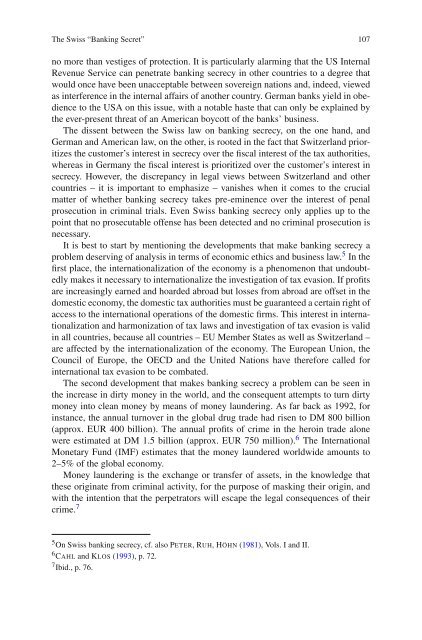The Ethics of Banking: Conclusions from the Financial Crisis (Issues ...
The Ethics of Banking: Conclusions from the Financial Crisis (Issues ...
The Ethics of Banking: Conclusions from the Financial Crisis (Issues ...
Create successful ePaper yourself
Turn your PDF publications into a flip-book with our unique Google optimized e-Paper software.
<strong>The</strong> Swiss “<strong>Banking</strong> Secret” 107<br />
no more than vestiges <strong>of</strong> protection. It is particularly alarming that <strong>the</strong> US Internal<br />
Revenue Service can penetrate banking secrecy in o<strong>the</strong>r countries to a degree that<br />
would once have been unacceptable between sovereign nations and, indeed, viewed<br />
as interference in <strong>the</strong> internal affairs <strong>of</strong> ano<strong>the</strong>r country. German banks yield in obedience<br />
to <strong>the</strong> USA on this issue, with a notable haste that can only be explained by<br />
<strong>the</strong> ever-present threat <strong>of</strong> an American boycott <strong>of</strong> <strong>the</strong> banks’ business.<br />
<strong>The</strong> dissent between <strong>the</strong> Swiss law on banking secrecy, on <strong>the</strong> one hand, and<br />
German and American law, on <strong>the</strong> o<strong>the</strong>r, is rooted in <strong>the</strong> fact that Switzerland prioritizes<br />
<strong>the</strong> customer’s interest in secrecy over <strong>the</strong> fiscal interest <strong>of</strong> <strong>the</strong> tax authorities,<br />
whereas in Germany <strong>the</strong> fiscal interest is prioritized over <strong>the</strong> customer’s interest in<br />
secrecy. However, <strong>the</strong> discrepancy in legal views between Switzerland and o<strong>the</strong>r<br />
countries – it is important to emphasize – vanishes when it comes to <strong>the</strong> crucial<br />
matter <strong>of</strong> whe<strong>the</strong>r banking secrecy takes pre-eminence over <strong>the</strong> interest <strong>of</strong> penal<br />
prosecution in criminal trials. Even Swiss banking secrecy only applies up to <strong>the</strong><br />
point that no prosecutable <strong>of</strong>fense has been detected and no criminal prosecution is<br />
necessary.<br />
It is best to start by mentioning <strong>the</strong> developments that make banking secrecy a<br />
problem deserving <strong>of</strong> analysis in terms <strong>of</strong> economic ethics and business law. 5 In <strong>the</strong><br />
first place, <strong>the</strong> internationalization <strong>of</strong> <strong>the</strong> economy is a phenomenon that undoubtedly<br />
makes it necessary to internationalize <strong>the</strong> investigation <strong>of</strong> tax evasion. If pr<strong>of</strong>its<br />
are increasingly earned and hoarded abroad but losses <strong>from</strong> abroad are <strong>of</strong>fset in <strong>the</strong><br />
domestic economy, <strong>the</strong> domestic tax authorities must be guaranteed a certain right <strong>of</strong><br />
access to <strong>the</strong> international operations <strong>of</strong> <strong>the</strong> domestic firms. This interest in internationalization<br />
and harmonization <strong>of</strong> tax laws and investigation <strong>of</strong> tax evasion is valid<br />
in all countries, because all countries – EU Member States as well as Switzerland –<br />
are affected by <strong>the</strong> internationalization <strong>of</strong> <strong>the</strong> economy. <strong>The</strong> European Union, <strong>the</strong><br />
Council <strong>of</strong> Europe, <strong>the</strong> OECD and <strong>the</strong> United Nations have <strong>the</strong>refore called for<br />
international tax evasion to be combated.<br />
<strong>The</strong> second development that makes banking secrecy a problem can be seen in<br />
<strong>the</strong> increase in dirty money in <strong>the</strong> world, and <strong>the</strong> consequent attempts to turn dirty<br />
money into clean money by means <strong>of</strong> money laundering. As far back as 1992, for<br />
instance, <strong>the</strong> annual turnover in <strong>the</strong> global drug trade had risen to DM 800 billion<br />
(approx. EUR 400 billion). <strong>The</strong> annual pr<strong>of</strong>its <strong>of</strong> crime in <strong>the</strong> heroin trade alone<br />
were estimated at DM 1.5 billion (approx. EUR 750 million). 6 <strong>The</strong> International<br />
Monetary Fund (IMF) estimates that <strong>the</strong> money laundered worldwide amounts to<br />
2–5% <strong>of</strong> <strong>the</strong> global economy.<br />
Money laundering is <strong>the</strong> exchange or transfer <strong>of</strong> assets, in <strong>the</strong> knowledge that<br />
<strong>the</strong>se originate <strong>from</strong> criminal activity, for <strong>the</strong> purpose <strong>of</strong> masking <strong>the</strong>ir origin, and<br />
with <strong>the</strong> intention that <strong>the</strong> perpetrators will escape <strong>the</strong> legal consequences <strong>of</strong> <strong>the</strong>ir<br />
crime. 7<br />
5 On Swiss banking secrecy, cf. also PETER,RUH,HÖHN (1981), Vols. I and II.<br />
6 CAHL and KLOS (1993), p. 72.<br />
7 Ibid., p. 76.

















